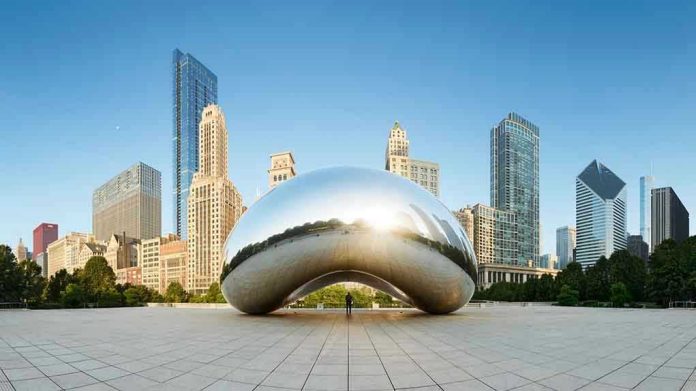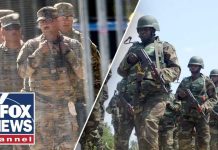
A looming federal crackdown in Chicago has ignited fierce debate over constitutional authority, local control, and the future of urban policing as President Trump targets the city for intervention after asserting success in Washington, D.C.
Story Snapshot
- President Trump announces Chicago as the next focus for a federal anti-crime campaign following federal intervention in D.C.
- Trump cites dramatic crime reductions in D.C. and threatens deployment of the National Guard or military to Chicago if necessary.
- Chicago officials—including Mayor Brandon Johnson—strongly oppose federal or military intervention, emphasizing local crime reductions in 2025.
- The move reignites debate over federal authority, local autonomy, and the risks of militarized policing in American cities.
Trump’s Federal Crime Crackdown Targets Chicago
On August 22, 2025, President Donald Trump declared that Chicago would be the next focal point in his administration’s campaign against urban crime. Trump’s announcement follows what he described as a successful federal intervention in Washington, D.C., where the federal government took control of law enforcement earlier in the month and claims of sharply reduced violent crime have been widely circulated. Trump signaled that similar measures—including the possible deployment of the National Guard or even regular military forces—could be used in Chicago and, subsequently, in New York City.
This move marks a significant escalation in the federal government’s involvement in local policing, reviving a strategy that has been both praised and contested in previous years. Trump’s rhetoric frames Chicago as a symbol of urban disorder and suggests that robust federal intervention is the only effective remedy. Local officials, however, contest both the need for outside intervention and the effectiveness of militarized approaches, underscoring the risk to local autonomy and civil liberties.
Local Leadership Pushes Back Against Federal Overreach
Chicago’s Mayor Brandon Johnson and other city leaders have issued strong public statements rejecting the need for federal or military intervention. They point to recent local data showing significant reductions in homicides, robberies, and shootings in 2025 compared to previous years. Officials argue that local policing reforms and community-based initiatives are yielding results, and that federal involvement—especially with military deployment—could inflame tensions and undermine hard-won community trust. Governor J.B. Pritzker has echoed these concerns, warning against the dangers of federal overreach and emphasizing the importance of respecting local governance.
Despite these statements, the Trump administration has not made formal requests or coordinated with Chicago officials about the proposed intervention. Instead, the administration’s approach has bypassed local leadership, intensifying federal-local tensions that have simmered for years, especially around issues such as immigration enforcement and “sanctuary city” policies.
Constitutional Questions and Community Impact
The potential deployment of federal agents or military forces in Chicago raises significant constitutional questions about the limits of federal authority and the role of local government in law enforcement. Legal scholars caution that using the military domestically without local consent could violate the Posse Comitatus Act and established legal norms. These concerns are heightened by memories of controversial federal interventions in the past, such as Operation Legend in 2020, which saw a temporary reduction in crime but also sparked widespread opposition and fears of government overreach.
Community leaders warn that aggressive federal action could erode trust between law enforcement and residents, particularly in minority communities that have historically faced disproportionate policing. While Trump cites anecdotal support from residents for federal intervention, there is no credible evidence of a broad-based local call for such measures. Instead, local leaders and residents appear divided, with many fearing that militarized tactics will do more harm than good.
Political Stakes and the Broader Debate Over Urban Crime
This high-profile standoff between the Trump administration and Chicago’s local leadership encapsulates larger national debates over crime, policing, and the balance of power between federal and local authorities. For supporters of the administration, the initiative is viewed as a necessary step to restore order and protect law-abiding citizens—particularly in cities portrayed as plagued by progressive mismanagement and soft-on-crime policies. For opponents, it represents an alarming expansion of federal power at the expense of local control and civil liberties, with the specter of government overreach and the risk of inflaming social tensions.
As of late August 2025, no federal or military personnel have been deployed in Chicago, and local crime rates continue to show improvement. The coming weeks will test whether the administration proceeds with its plans and how the city—and the nation—responds to this latest flashpoint in the ongoing struggle over law, order, and American constitutional values.
Sources:
TIME: Chicago Is Trump’s Next Target for Federal Crime Crackdown
City of Chicago Official Statement: Mayor Johnson Responds to National Guard Threat
WTTW News: Mayor Johnson Hits Back at Trump’s Plans to Deploy National Guard in Chicago



